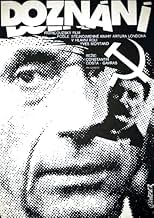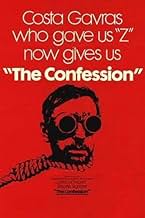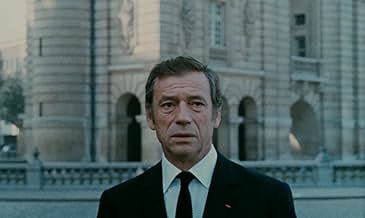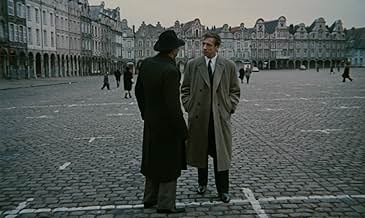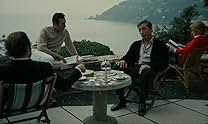IMDb रेटिंग
7.8/10
5.1 हज़ार
आपकी रेटिंग
अपनी भाषा में प्लॉट जोड़ेंA high-ranking official is forced to confess to high treason.A high-ranking official is forced to confess to high treason.A high-ranking official is forced to confess to high treason.
- 1 BAFTA अवार्ड के लिए नामांकित
- 3 जीत और कुल 3 नामांकन
फ़ीचर्ड समीक्षाएं
The split between Tito and Stalin (1948), in the late 1940s and early 1950s, was followed by show trials of prominent Communists all over Eastern Europe and the wave of Stalinist purges in which tens of thousands suffered or lost their lives. This movie is about the 1952 process in Prague, conducted against Rudolf Slánský and 13 other leading members of the Communist Party of Czechoslovakia (KSC). The main protagonist - Anton Ludvik, aka Gerard, is based on Arthur London, veteran of the Spanish Civil War and the French resistance movement, who, at the time of the arrest, was vice-minister of Foreign Affairs of Czechoslovakia and a senior official of KSC. Display of Stalinist torture and interrogation process in preparation for rigged political trial is very realistic. Based on actual events.
In "L'Aveau" Costa-Gavras breaks at once and for all in defending one political ideology and attacking the other, like he did in "Z". This time he goes to show that both sides have their problematic aspects, they all make severe mistakes, we can't know which was good and which was bad. The bottom of line is that both with capitalism and communism someone decent always had to pay the prize for trying to do the right thing.
Yves Montand plays the victim once again (murdered in "Z" and arrested by militants in "Etat de Siege" closing the combative Gavras political trilogy, "Missing" goes as an addendum, made years later after those films), a Czech and Communist vice-minister who'll be arrested and suffer on the hands of other members of the party who consider him a traitor of their cause. They believe he was a spy who had connections with American officials and all they want is a full confession of his crimes, which never existed, never happened (and they know that!), using of mental and physical methods to achieve results with the prisoner. The confession extraction is the real purpose to be visualized in here, exploited in painful and realistic details, methods used by the Communist - I recalled some of the descriptions made by Soljenitsin in "Gulag Archipelag", released on the same year as "L'Aveau" - like privation of sleep, keep marching at all times inside of the cell, and many other horrible techniques they used on prisoners during months and years if possible in order to break their resistance and confess everything, real or not.
We have to give plenty of credit to Montand during those scenes, which are not few. Definitely not an easy shooting to make, you feel his exhaustion, weakening each frame goes by, the visible weight-loss, he went to extremes very few actors can reach and no, this isn't much method acting, one does not go in training method for those scenes, he just put himself there at each sequence. It doesn't go well for the character and it sure does not go well with the audience. It's hard to watch since the brutality and the frequency everything happens is so repetitive as if Gavras was trying to make the people in the audience to break out from the movie when in fact he's just being real with the events, causing some stir in us to the point where we ask ourselves how come this guy is not guilty of treason.
In this manifest against the totalitarianism, the writer and director seemed to not making of the Socialists the almost heroes they were in "Z", while investigating the assassination of the popular leader. Their destructive paranoia, the unsubstantial suspicion they had with their own members, it's all a smoke curtain to hide the flaws of bigger people working on the Party and to hide the failures of a deeply flawed and inconsistent regime.
Authentic, honorable and well-acted in all possible ways, just not much easy to endure. But truthful, powerful, haunting and rewarding nonetheless. 9/10
Yves Montand plays the victim once again (murdered in "Z" and arrested by militants in "Etat de Siege" closing the combative Gavras political trilogy, "Missing" goes as an addendum, made years later after those films), a Czech and Communist vice-minister who'll be arrested and suffer on the hands of other members of the party who consider him a traitor of their cause. They believe he was a spy who had connections with American officials and all they want is a full confession of his crimes, which never existed, never happened (and they know that!), using of mental and physical methods to achieve results with the prisoner. The confession extraction is the real purpose to be visualized in here, exploited in painful and realistic details, methods used by the Communist - I recalled some of the descriptions made by Soljenitsin in "Gulag Archipelag", released on the same year as "L'Aveau" - like privation of sleep, keep marching at all times inside of the cell, and many other horrible techniques they used on prisoners during months and years if possible in order to break their resistance and confess everything, real or not.
We have to give plenty of credit to Montand during those scenes, which are not few. Definitely not an easy shooting to make, you feel his exhaustion, weakening each frame goes by, the visible weight-loss, he went to extremes very few actors can reach and no, this isn't much method acting, one does not go in training method for those scenes, he just put himself there at each sequence. It doesn't go well for the character and it sure does not go well with the audience. It's hard to watch since the brutality and the frequency everything happens is so repetitive as if Gavras was trying to make the people in the audience to break out from the movie when in fact he's just being real with the events, causing some stir in us to the point where we ask ourselves how come this guy is not guilty of treason.
In this manifest against the totalitarianism, the writer and director seemed to not making of the Socialists the almost heroes they were in "Z", while investigating the assassination of the popular leader. Their destructive paranoia, the unsubstantial suspicion they had with their own members, it's all a smoke curtain to hide the flaws of bigger people working on the Party and to hide the failures of a deeply flawed and inconsistent regime.
Authentic, honorable and well-acted in all possible ways, just not much easy to endure. But truthful, powerful, haunting and rewarding nonetheless. 9/10
"The Confession" is an uber-bleak film that stars Yves Montand as a loyal member of the Communist party who is turned on and made a scapegoat of when the party becomes paranoid about informers. He is imprisoned and systematically tortured until he admits to crimes against the party he didn't actually commit. Simone Signoret has a much smaller role as his wife, who sees her home invaded by Communist party thugs during the time in which her husband is in prison.
"The Confession" I think provides a good illustration of the pitfalls of Communism, which, despite its merits on paper, rarely works as an actual system. Those who adhere to it feel too persecuted to remain secure for long, and they turn against each other, convinced of double crossings and disloyalty to the party. It reminded me very much of the excellent novel "Darkness at Noon," which similarly examines the ways in which Communism eventually falls apart in practice.
I can't say I necessarily enjoyed "The Confession." It's extremely one-note; the film doesn't really have much of a dramatic arc. It's not able to marry the qualities of political expose and thriller the way another of director Costa-Gavras's classics, "Z," is. But I would still recommend it.
Grade: B+
"The Confession" I think provides a good illustration of the pitfalls of Communism, which, despite its merits on paper, rarely works as an actual system. Those who adhere to it feel too persecuted to remain secure for long, and they turn against each other, convinced of double crossings and disloyalty to the party. It reminded me very much of the excellent novel "Darkness at Noon," which similarly examines the ways in which Communism eventually falls apart in practice.
I can't say I necessarily enjoyed "The Confession." It's extremely one-note; the film doesn't really have much of a dramatic arc. It's not able to marry the qualities of political expose and thriller the way another of director Costa-Gavras's classics, "Z," is. But I would still recommend it.
Grade: B+
I saw it as a Eastern viewer, knowing , directly, few crumbs of the last decade of Ceausescu regime. I saw it, too, as History teacher. And as one of familiars with the universe of Costa Gavras cinematographic work. It is a pure masterpiece , first for the high dose of truth. Second, for acting. Not the last, for the final part . In essence a try of exorcism. Brutal, honest, precise. Maybe useful.
Anton Ludvik, aka Gerard, is vice-minister of Foreign Affairs of Czechoslovakia. He realizes he is watched and followed. One day, he is arrested and put into jail, in solitary confinement. Will be shown the mental tortures during the investigations and how a faithful top-ranking civil servant is made to confess to treason.
A French political thriller based on a real story in Czechoslovakia? Wow! This actually makes a lot of sense. The Czech people do not have many stories told about them, but they do happen to live in an unfortunate area, sandwiched between Germany and Russia. And, as we know, throughout the 20th Century, those two nations liked to assert their influence on the neighbors.
It is so great to see the story here of a man who stood against the Nazis now having to fight back against the politicians he helped support (sort of).
A French political thriller based on a real story in Czechoslovakia? Wow! This actually makes a lot of sense. The Czech people do not have many stories told about them, but they do happen to live in an unfortunate area, sandwiched between Germany and Russia. And, as we know, throughout the 20th Century, those two nations liked to assert their influence on the neighbors.
It is so great to see the story here of a man who stood against the Nazis now having to fight back against the politicians he helped support (sort of).
क्या आपको पता है
- ट्रिवियाThe film was restored in 2014 by KG Productions with the support of the CNC under the supervision of Costa-Gavras by Éclair Group for the image and L.E. Diapason for the sound.
- कनेक्शनEdited into Le tombeau d'Alexandre (1993)
- साउंडट्रैकL'Aveu (Générique)
Written by Giovanni Fusco
टॉप पसंद
रेटिंग देने के लिए साइन-इन करें और वैयक्तिकृत सुझावों के लिए वॉचलिस्ट करें
- How long is The Confession?Alexa द्वारा संचालित
विवरण
- रिलीज़ की तारीख़
- कंट्री ऑफ़ ओरिजिन
- भाषाएं
- इस रूप में भी जाना जाता है
- The Confession
- फ़िल्माने की जगहें
- Grand Place, Arras, Pas-de-Calais, फ़्रांस(London seeing Kahoutek for the last time)
- उत्पादन कंपनियां
- IMDbPro पर और कंपनी क्रेडिट देखें
बॉक्स ऑफ़िस
- US और कनाडा में सकल
- $3,29,954
इस पेज में योगदान दें
किसी बदलाव का सुझाव दें या अनुपलब्ध कॉन्टेंट जोड़ें


